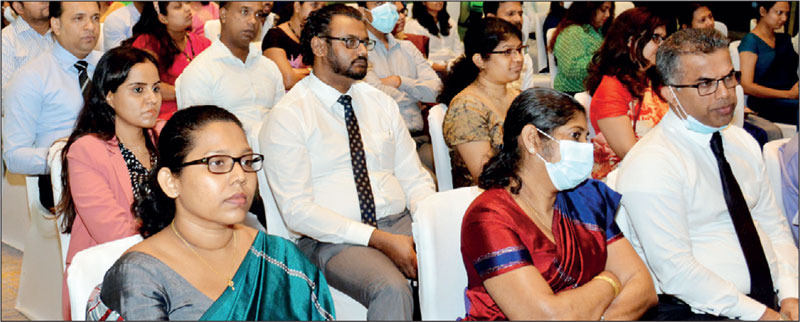Monday Feb 16, 2026
Monday Feb 16, 2026
Wednesday, 23 November 2022 00:00 - - {{hitsCtrl.values.hits}}

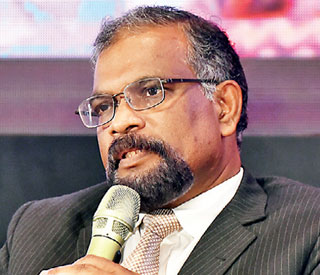
 We are trying our best to collect the expected revenues. Of course, this is an estimation and there could be many risks. The increase in revenue is also important, otherwise, we will not be able to maintain the system. I’m facing a very difficult situation and if you are not going to collect this revenue will adversely affect the future too — Treasury Secretary Mahinda Siriwardena
We are trying our best to collect the expected revenues. Of course, this is an estimation and there could be many risks. The increase in revenue is also important, otherwise, we will not be able to maintain the system. I’m facing a very difficult situation and if you are not going to collect this revenue will adversely affect the future too — Treasury Secretary Mahinda Siriwardena
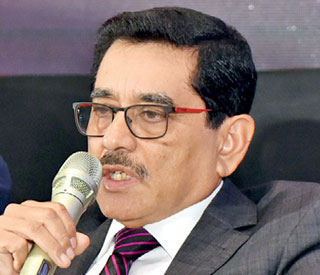
 The full impact of the monetary policy takes about 12-18 months. This means the results of the full impact of tightening the Monetary Policy will come towards the end of next year. This is where we think inflation will also come to normal levels like we have seen in the past before the economic crisis. It is a process. With that, we also hope the interest rate will also come down — Central Bank Governor Dr. Nandalal Weerasinghe
The full impact of the monetary policy takes about 12-18 months. This means the results of the full impact of tightening the Monetary Policy will come towards the end of next year. This is where we think inflation will also come to normal levels like we have seen in the past before the economic crisis. It is a process. With that, we also hope the interest rate will also come down — Central Bank Governor Dr. Nandalal Weerasinghe
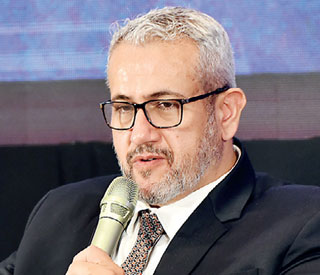
 In the absence of effective measures, poverty is expected to further increase in Sri Lanka. International evidence shows that having effective social protection systems and institutions in place is critical not only in normal times but also to respond to crises — World Bank Country Director Sri Lanka, Maldives, Nepal and South Asia Faris Hadad-Zervos
In the absence of effective measures, poverty is expected to further increase in Sri Lanka. International evidence shows that having effective social protection systems and institutions in place is critical not only in normal times but also to respond to crises — World Bank Country Director Sri Lanka, Maldives, Nepal and South Asia Faris Hadad-Zervos
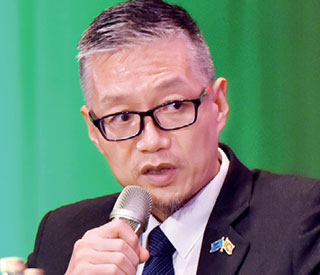
 The economic crisis holds a window of opportunity to rebuild the economy with reforms and transparent systems. The Interim Budget 2022, reaching staff-level agreement on the IMF program and the Budget 2023 policy document are important milestones of stabilisation and the path to recovery. It is important to remember that Sri Lanka is still not out of the woods yet, and there is a long way ahead — Asian Development Bank Country Director Dr. Chen Chen
The economic crisis holds a window of opportunity to rebuild the economy with reforms and transparent systems. The Interim Budget 2022, reaching staff-level agreement on the IMF program and the Budget 2023 policy document are important milestones of stabilisation and the path to recovery. It is important to remember that Sri Lanka is still not out of the woods yet, and there is a long way ahead — Asian Development Bank Country Director Dr. Chen Chen
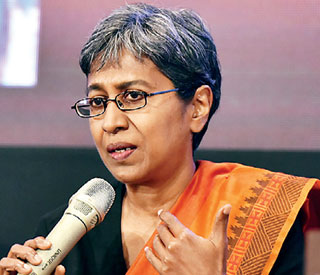
 2023 is a critical electoral year and I think we have to pick and choose very carefully some of the doable targets within the next 18-24 months. Build consensus and support among political parties, trade unions, and the public sector to get those off the ground. I think there is a general appetite for that as many think that Sri Lanka has dug itself into a pit and we have to get out somehow — Institute of Policy Studies Executive Director Dr. Dushni Weerakoon
2023 is a critical electoral year and I think we have to pick and choose very carefully some of the doable targets within the next 18-24 months. Build consensus and support among political parties, trade unions, and the public sector to get those off the ground. I think there is a general appetite for that as many think that Sri Lanka has dug itself into a pit and we have to get out somehow — Institute of Policy Studies Executive Director Dr. Dushni Weerakoon
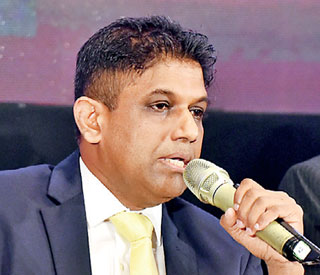
 Looking at the interest cost and the fiscal stress going into the next year, and we are trying to recover the revenue in a contracting economy, hence 2023 Budget targets appear too optimistic. Sri Lanka can manage this with IMF Board-level approval, but that is not going to be enough. We need to attract sound investments worth over $ 2-$ 3 billion so that we can reduce the domestic debt — Standard Chartered Bank Sri Lanka CEO Bingumal Thewarathanthri
Looking at the interest cost and the fiscal stress going into the next year, and we are trying to recover the revenue in a contracting economy, hence 2023 Budget targets appear too optimistic. Sri Lanka can manage this with IMF Board-level approval, but that is not going to be enough. We need to attract sound investments worth over $ 2-$ 3 billion so that we can reduce the domestic debt — Standard Chartered Bank Sri Lanka CEO Bingumal Thewarathanthri
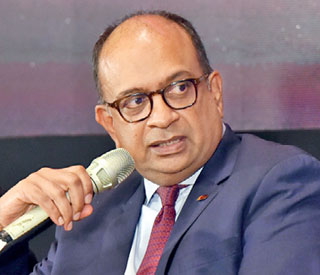
 We cannot live in a false prerogative that we are beginning to move forward. We need to continue to encourage the Government to keep doing reforms. Both ADB and the World Bank Chiefs spoke of looking after the vulnerable. We also as a society need to keep moving up those vulnerable levels and reduce the numbers. We need to know what to do about that or otherwise, we keep saying 40% of our population is vulnerable — Ceylon Chamber of Commerce Chairman Vish Govindasamy
We cannot live in a false prerogative that we are beginning to move forward. We need to continue to encourage the Government to keep doing reforms. Both ADB and the World Bank Chiefs spoke of looking after the vulnerable. We also as a society need to keep moving up those vulnerable levels and reduce the numbers. We need to know what to do about that or otherwise, we keep saying 40% of our population is vulnerable — Ceylon Chamber of Commerce Chairman Vish Govindasamy
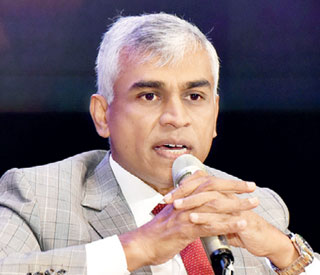
 If you fix the accountability, and policy consistency and take hard decisions, then this country will straighten out in two to three years. Even in a company, you can do it, only if your employees fit in the management. If the Government is in a position to get faith from the people that the State is doing the right thing, the Government is accountable and they are accountable to the people, then this budget will succeed, otherwise, this Budget will not succeed — Lanka Tiles Plc Managing Director Mahendra Jayasekara
If you fix the accountability, and policy consistency and take hard decisions, then this country will straighten out in two to three years. Even in a company, you can do it, only if your employees fit in the management. If the Government is in a position to get faith from the people that the State is doing the right thing, the Government is accountable and they are accountable to the people, then this budget will succeed, otherwise, this Budget will not succeed — Lanka Tiles Plc Managing Director Mahendra Jayasekara
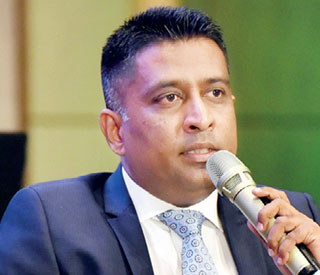
 There is greater political and economic stability in the country than in the recent past and the Budget announced a wide range of reforms as well as restructuring of SOEs. Colombo stock market has a few challenges such as low liquidity and current high inflation and interest rates. There are signs of those easing going forward. The current Price Earnings (PE) ratios is very low on a host of fundamentally strong stocks. Overall the market remains attractive and there is value in select companies – SC Securities CEO Roshantha Fernando
There is greater political and economic stability in the country than in the recent past and the Budget announced a wide range of reforms as well as restructuring of SOEs. Colombo stock market has a few challenges such as low liquidity and current high inflation and interest rates. There are signs of those easing going forward. The current Price Earnings (PE) ratios is very low on a host of fundamentally strong stocks. Overall the market remains attractive and there is value in select companies – SC Securities CEO Roshantha Fernando
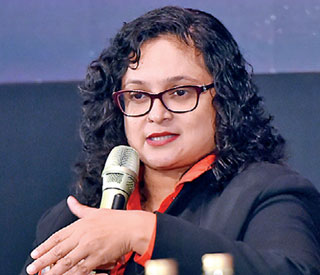
 The Tax Ombudsman’s role is to look into malpractice and tax administration, but not on the law side. So, it is good if we can this time around bring the Tax Ombudsman by a piece of legislation or Act where it gives the power to make a direction to the IRD to do something about it or give a solution to the grievances of the taxpayers —PriceWaterhouseCoopers Sri Lanka Tax Director Charmaine Tillekaratne
The Tax Ombudsman’s role is to look into malpractice and tax administration, but not on the law side. So, it is good if we can this time around bring the Tax Ombudsman by a piece of legislation or Act where it gives the power to make a direction to the IRD to do something about it or give a solution to the grievances of the taxpayers —PriceWaterhouseCoopers Sri Lanka Tax Director Charmaine Tillekaratne
Multilateral donors as well as Sri Lanka’s private sector champions on Friday shared their key insights to the 2023 Budget at a packed and interactive forum organised by the Daily FT-Colombo University MBA Alumni Association at Shangri-La, Colombo. President and Finance Minister Ranil Wickremesinghe was the Chief Guest.
Business leaders stood their ground on the 2023 Budget proposals and the overall reforms that need to be implemented in the immediate future, to stabilise the economy and lay down a sound macroeconomic bedrock for sustainable recovery and growth. Multilateral donors and economists too backed reforms along with strengthening the social protection whilst Government officials expanded on 2023 Budget measures aimed at ensuring stability followed by growth.
Overall the post-Budget Forum titled ‘Hurdling towards opportunities beyond challenges’ highlighted key insights from an eminent panel comprising Treasury Secretary Mahinda Siriwardena, Central Bank Governor Dr. Nandalal Weerasinghe, World Bank Country Director Sri Lanka, Maldives, Nepal and South Asia Faris Hadad-Zervos, Asian
Development Bank Country Director Dr. Chen Chen, Institute of Policy Studies Executive Director Dr. Dushni Weerakoon, SCB Sri Lanka CEO Bingumal Thewarathanthri, Ceylon Chamber of Commerce Chairman Vish Govindasamy, Lanka Tiles Plc Managing Director Mahendra Jayasekara, PriceWaterhouseCoopers Sri Lanka Tax Director Charmaine Tillekaratne, SC Securities CEO Roshantha Fernando and Colombo Uni. MBAA President Chandima Samarasinghe. It was moderated by Daily FT Editor and CEO Nisthar Cassim.
Standard Chartered Bank was the Strategic Partner whilst other partners were SC Securities, PwC and Ogilvy Digital.
Here are excerpts from the Q&A with the panelists who raised reasonable concerns on overestimated revenue targets, rationalisation of high Government expenditure, negligence to implement old reforms, brain drain, business conduciveness, foster investment, and policy inconsistency during the Daily FT-Colombo University MBA Alumni Association post-Budget Forum.
By Charumini de Silva
Q: How confident is the Treasury in achieving revenue and expenditure targets announced in the 2023 Budget?
Mahinda Siriwardena: Reducing the expenditure is not an easy task, especially given the structure of the Budget. A significant amount of resources are gone to payment of salaries, interest payments, and pensions. The ability to change this structure is very difficult. That is why this Budget has a host of measures, as the President also mentioned. The size of the Government is used over the years at the same time to improve the efficiency of the public sector and equip the restructuring of institutions and also proposals to merge some of the institutions. There are many Government institutions duplicating the work and if you can get rid of those or merge them would also ensure efficiency. E-governance and other related activities will contribute to improving the efficiency of the Government sector — that is the expectation.
From the revenue side, some time back we had higher revenue and in some years due to reduced taxes and loopholes in tax administration. Since then, between 20 years, it has come down drastically. One of the key reasons that the exemptions have been granted, is issues in the tax administration and also tax collection. So the proposals presented in the 2023 Budget are based on all these concerns.
If you see the last three months’ performance, there is a considerable increase in VAT and various other sources because of the rate increase and the inflation impact. So the nominal GDP has increased. Most importantly we have come up with two areas, one policy changes in revenue and administration improvement proposals. I want to highlight the tax administration side, although we have a policy we don’t have a system to get this revenue. Emphasis would be particularly from this year onwards on tax administration and the digital approach will play an important role in this administration’s efforts, particularly in collecting all the information and getting all the other institutions’ information together to maintain a good database.
In the Interim Budget, there was a proposal to open a tax file for all those who are above 18 years of age and that will also be implemented. This would inculcate a system for taxpayers and create a culture to pay their due taxes. What we have seen so far is some people are afraid to pay taxes, and some avoid them. You have to address all these issues simultaneously, otherwise just increasing rates will not give that revenue. Efforts on the tax administration side have been addressed whilst also maintaining the linkages as mentioned.
We are trying our best to collect the expected revenues. Of course, this is an estimation and there could be many risks. The increase in revenue is also important, otherwise, we will not be able to maintain the system. I’m facing a very difficult situation and if you are not going to collect this revenue will adversely affect the future too. We need to have a combination of revenue increases and expenditure reductions. So we can take on fiscal operations in a more manageable manner.
Q: How do you see deficit financing being done and how long do you think this high-interest rate regime will continue?
Dr. Nandalal Weerasinghe: Looking at the monetary policy stance we have taken from April onwards we have taken some strict measures to curtail a Hyper Inflation situation. As a result of our strict measures, we have been able to take control of inflation. Inflation already peaked at 70% year-on-year and it came down to 66% last month after 13-14 months. We predict that disinflation will continue and the trend will continue going forward. This is where we think we can reduce the interest as well. The full impact of the monetary policy takes about 12-18 months. This means the results of the full impact of tightening the Monetary Policy will come towards the end of next year.
This is where we think inflation will also come to normal levels like we have seen in the past before the economic crisis. It is a process. With that, we hope the interest rate will also come down. We have to understand that the current interest rates are high. But this is a priority area. If inflation goes out of control, it would not matter what the interest rate is. The cost of production goes up with inflation, and if it is not controlled, even exporters cannot do business and impact the poor and vulnerable, fixed income earners and pensioners will have a severe impact.
In terms of deficit financing, I see a lot of debate and theories going around. Maintaining inflation is a priority. It wouldn’t matter what the interest rate is if there is no control over inflation.
The Central Bank continued to finance the Government. This is the only way the Government has been able to survive when we took over, but we can’t stop it overnight.
I also want to set the record straight on change in reserve money. From 15 September 2021 to 4 April 2022 the change in reserve money was Rs. 138 billion while the change in currency was at Rs. 129.8 billion and deposits amounted to Rs. 7.6 billion. Thereafter, from 7 April 2021 to 17 November 2022 the change in reserve money was at negative Rs. 89.6 billion while the change in currency was at negative Rs. 144.2 billion and the deposits amounted to Rs. 54.3 billion. In terms of years, in 2020 change in money reserves was at Rs. 31.6 billion, while the change in currency was at Rs. 156.8 billion and deposits amounted to negative Rs. 125.2 billion. In the year 2021 change in money reserves was at Rs. 341.6 billion, while the change in currency was at Rs. 170.3 billion and deposits amounted to minus Rs. 171.3 billion. During this year from January to October, change in money reserves was at Rs. 47 billion, while the change in currency was at Rs. 21 billion and deposits amounted to Rs. 26 billion.
Q: How does the ADB view the 2023 Budget and challenges in realising the targets?
Dr. Chen Chen: We commend the concerted efforts taken to contain the economic crisis under the leadership of President Wickremesinghe. Budget 2023 is one critical piece of the policy framework that the country needs to restore stability and lay foundations for a sustainable and inclusive recovery. It is not a standalone document. It continues the path laid out by the interim budget 2022 presented in August 2022.
We see measures to stabilise the economy, including reforming the social protection programs and strengthening the financial sector. There are also measures toward restoring fiscal and debt sustainability including domestic revenue mobilisation and public financial management. Sustainable macroeconomic framework and an early recovery will depend on the progress in this area.
Additionally there is emphasis on reforming SOEs through an overall framework for SOE reforms, restructuring, and cost-reflective pricing especially in the energy sector SOEs. These are all critical actions with both near-term and long-term impacts to the economy.
We are also glad to note that addressing climate change is not missed in the action plan. The ambition of creating an international university for climate change is encouraging.
Among others, the commitments, and measures of opening the economy are particularly impressive to me. Sri Lanka’s participation in regional and global value chains will play an important role in speeding up the recovery process.
The three key challenges in realising the targets. First is on building a broad consensus. The public will need to be provided timely and adequate information to understand the reforms, so that they can support. This kind of buy-in will be critical for the Government to continue the reform agenda.
Second is on implementation. Deep reforms are needed and the path to reforms will not be easy. While we understand that specifics are being developed, urgency of those measures should be recognised. Success of a comprehensive and deep program of reforms will depend on the quality and efficiency of implementation to achieve time-bound targets.
Finally, inclusiveness. Social protection was my first observation. Now I would like to call it a challenge. Social safety nets to protect those who are affected by the crisis and the reforms will be critical. Although perfect solutions are not to be looked for in an imperfect world, the current system still needs a lot of improvement to be fair, efficient, and transparent, and to be trusted by the public.
The ADB is closely working with the President’s office, Prime Minister’s office, Finance Ministry, the Central Bank and many other agencies including the private sector and civil societies. The ADB is also working with the IMF, the World Bank and other development agencies. The economic crisis holds a window of opportunity to rebuild the economy with reforms and transparent systems. The Interim Budget 2022, reaching staff-level agreement on the IMF program and the Budget 2023 policy document are important milestones of stabilisation and the path to recovery. It is important to remember that Sri Lanka is still not out of the woods yet, and there is a long way ahead.
Q: The 2023 Budget has a considerable focus on social protection for the poorer and vulnerable segments of society. The World Bank has stepped up support in this regard too. Can you explain the rationale and how would the World Bank ensure its effective implementation?
Faris Hadad-Zervos: Owing to multiple crises in Sri Lanka, poverty and vulnerability increased and can further deteriorate in months to come due to price adjustments. In this background, ensuring adequate Budget and effective support to the most in need would be critical during these difficult times. It is critical to support the establishment of the social registry and application of the new eligibility criteria which will ensure a more effective and reliable targeting system for poverty-targeted programs. Invest in strengthening the grievance mechanisms that would enhance timely response and adaptation of interventions. Poverty in 2022 is estimated to have doubled and vulnerability also increased significantly this year and a small negative income shock will make them fall into poverty.
In the absence of effective measures, poverty is expected to further increase in Sri Lanka. International evidence shows that having effective social protection systems and institutions in place is critical not only in normal times but also to respond to crises. The Government of Sri Lanka has been making good progress in developing a well-functioning and robust social registry in the past months, with over 3.4 million families registered already. The successful implementation is going to be critical going forward.
Q: Are you happy with the reforms mentioned in the Budget and where do you see the implementation challenges?
Dr. Dushni Weerakoon: I think when you look at the direction, stabilisation is going to be the preoccupation for the next 12-18 months. Reforms have to kick in because this is not a downturn, recovery or continuing business as usual when a country goes into a recession and following that a debt default.
Coming out of that, when there are so many uncertainties related to your recovery path given the complexities of debt restructuring, time is taken to regain the investor and creditor confidence, and return to the market. The outlook and the traction for next year and recovery will be slow.
Reforms are essential for stabilising processes at some point and what the President outlined in terms of Sri Lanka having to look out at 7% to 8% growth with a consumer base of over 20 million, we have to look outward and sell our goods and services to foreigners as exports.
Some reforms of the 2023 Budget, I think are the initial indicators of the direction of the economic policy. Lots more have to come in the detail to be worked out. Some of the reforms mentioned such as SOE reforms, public sector reforms, and labour market reforms — are politically difficult reforms to get through. I think in some sense, overburdening a reform package may also be counterproductive unless you have a very assured majority in the Parliament. The kind of reforms we saw in the 1977 economic shock, but you have a comfortable majority that can be easily pushed through.
In Sri Lanka, we should also remember that in 2024 there is going to be an election. It is a critical electoral year for us and I think we have to pick and choose very carefully some of the doable targets within the next 18-24 months. Build consensus and support among political parties, trade unions, and the public sector to get those off the ground. I think there is a general appetite for that as many think that Sri Lanka has dug itself into a pit and we have to get out somehow. So, I think critical reforms that will raise our productivity and competitiveness are pretty much what are mentioned in the Budget, we should spend the next 12 months working out the details.
Come November 2023, when the next Budget cycle kicks off, there is something to report because the credibility of Budget pronouncements is pretty low and we must regain confidence in the Budgetary process to say these are not just announcements, but received proposals that are intended to be carried through.
I think the proposals are moving in the right direction. Now we must simply get down to the nitty-gritty of it and work through and reign all the other reforms in a phased manner and not overcrowd the agenda right now. Because our implementation capacities are weak. We have not done any major reforms since the early 1990s. So instead of being too ambitious, if we can focus on labour, public, and SOE reforms, if we can get on those in the next 18-24 months down the line, we can bring the other matters in line.
Q: How do you see the Budget as a banker as well as in attracting FDIs?
Bingumal Thewarathanthri: This is the first time Sri Lanka is presenting a Budget whilst going to the IMF for debt suspension. From that perspective, I think the Budget has tried to stay in line with the IMF staff-level agreement which is our sentiment on a no-choice basis. This Budget is about how to manage the crisis and not on how to take the country to the next level focusing more on reforms but more importantly crossing the external debt restructuring will be critical. The larger challenge however is going to be another debt deficit of $ 2.4 trillion and a larger part of this will be financed through domestic banks.
Already there is a large amount of domestic debt and as per our estimates the interest cost will go up by $ 2.3 million or Rs. 800 billion. Around 60% of the tax increase will go into interest costs. The fiscal and monetary tightening also has a price. As per the analysis, our GDP growth is going to contract and we are going into a short-term recession — again there is no choice.
Every day that you delay on the Board approval will have a huge price for Sri Lanka to pay. Therefore getting the IMF package before March is critical and running the country beyond March without Board approval and debt restructuring ideally by September will be extremely difficult for Sri Lanka by looking at some of the other markets.
If you look at the interest cost and the fiscal stress going into the next year, and we are trying to recover the revenue in a contracting economy, our targets are too optimistic.
The only way we can manage this is with IMF Board-level approval, but that is not going to be enough. The only way we can survive is by attracting sound investments worth over $ 2 to $ 3 billion apart from the IMF money so that we can reduce the domestic debt.
Talking about FDIs, unfortunately, as a country, we have not done a great job in comparison to countries such as Myanmar, Vietnam and Cambodia over the years. In a crisis situation like this, it is extremely difficult to bring in FDIs. But opportunistic investors are wanting to invest in emerging. We have to be open-minded and see who our partners are. This is another problem we see in the market. We don’t want to sell family jewellery and keep it and run it ourselves. This is a big mindset change for us because these are the times we have to compromise more than anything with foreign investors because no Fortune 500 companies are going to come into Sri Lanka and that is the harsh reality.
It is time for Sri Lanka to negotiate things better. There are still investors looking at ports, logistics, and tourism and if you stay open-minded, I’m sure we can attract a couple of billion-dollar investments in the next 18 months. We must reduce domestic debt financing, especially in the banking sector which has gone through tremendous pressure since the Easter attacks in 2019 from the moratoriums to COVID moratoriums. The ROI has come down to a single digit which is not a very good situation for an emerging market and the banking sector.
We all have toxic assets and every bank is doing a lot of restructuring, to make sure we keep the cannon off the road. When you want the economy to recover, it should include the banking sector which should go hand-in-hand. There are a lot of conversations on domestic debt restructuring and the banking sector will suffer and the capital ratios will come down to significantly low levels. Therefore, protecting the banking sector in an economic revival is critical. The banking sector will play a major role and has been doing much in terms of moratorium and debt restructuring process. You can see the sector profitability coming down slowly. But we need to work together and come out of the crisis to set a strong economic footing.
Q: List one good proposal in the Budget and one bad proposal?
Vish Govindasamy:For the first time, we have seen that freebies were not given and for me, it is a good proposal. I think this country has lived too much on freebies and we cannot go on giving subsidies, making false promises and core underwrites. The Treasury Secretary always comes under pressure for coming up with all these freebies. I saw that there will be paying wards to be established in State hospitals and I think it is about time. I think people need to know that you need to pay for what you get in return. I think already, all utilities are finally paying the right price and hopefully electricity, and fuel are not subsidised anymore — that is the way to go.
We cannot live in a false prerogative that we are beginning to move forward. We need to continue to encourage the Government to keep doing that. Both ADB and the World Bank Chiefs spoke of looking after the vulnerable. Yes, it is very important. But we also as a society need to keep moving up those vulnerable levels and reduce the numbers. We need to know what to do about that or otherwise, we keep saying 40% of our population is vulnerable. When are we going to reduce that number?
As business leaders, the Government should work on that and reduce the number of people in that vulnerable segment. As they say; when a man is hungry, giving him fish is not going to help, rather you have to teach him how to fish. This part needs to start happening.
On top of the bad proposals, I do not think it’s bad but, in terms of the income tax it is important and increasing to 36%, we have no choice. But in brackets, where our employees range between Rs. 5,000-7,000 million category — the huge chunk of tax is going to be very hard for the middle-income class to bear at huge increases because the total cash in their hands will be a lot less. At 70% inflation, this tax is coming in, and I do not know how they are going to survive unless December payrolls happen. I think the private sector is grappling to tackle it. This I hope will be rebooked at least the next time around.
I think one of the reasons why people are leaving is also because Sri Lanka is becoming unaffordable to live here. This is one of the key reasons why we lose a serious amount of talent and that is the category of talent the private sector has, so we will lose a significant talent pool.
Q: What are your views on the Budget from a manufacturing perspective?
Mahendra Jayasekara: From a manufacturing stance, my views are going to be interesting. I haven’t seen any new proposals from what we have seen in the past Budget proposals. Every time we saw these proposals, they said it was very progressive, development-oriented, and visionary. But here again, we are talking about where the progress, development, and vision are. In that sense, I am cautiously optimistic, because the same lawmakers who presented the Budget in the past 30 years are presenting another. So, we have to see how this is going to be implemented.
Budget in my view is the most important policy tool the Government has in directing the economy.
It is not a point talking about the past 30 years, at least since the 13 years the war ended, we haven’t used this tool to manage our economy. Policy inconsistency is a major drawback and is in this Budget too. That way it is the only consistency I’ve seen. As the Managing Director, before writing the view, I go through my previous observations to ensure consistency. If it is inconsistent, I would state why it is inconsistent. For example, last year companies obtained listings on the stock exchange to take advantage of the Government’s proposal to offer a 50% rebate on taxes. Last year they obtained a listing, expecting the rebate and this year it is gone. So, how do you expect the industry to go on?
In the last 15 years, the policy initiatives that we said were good haven’t worked because those policy initiatives haven’t created a conducive environment to grow private enterprises and that is why we are talking about companies moving out. It is not a question of the tax rate, but the industries should be able to make money. Even if you say do not pay any taxes, certain industries will move out of Sri Lanka, because it is not easy to do business in Sri Lanka.
If you look at digital freelancers, there are around 150,000 of them who make $ 100,000 a month. When I put them to certain Government institutions, some of them are not aware that there are digital freelancers. They don’t pay any taxes, they keep all their money in virtual banks but now most of them are moving out to Dubai. When asked why they were moving out, they said there is no policy framework for them to grow their businesses. Even if the taxes are at 0% people will still move out of Sri Lanka, unless the Government seriously shows policy consistency and adequate sensibility and flexibility to industries. People will stay only if they can make money.
You all are from the private sector, but how many of you’ll go and build hospitals? Buildings for schools? What you go and do is what the Government should be doing. What you say is rich, is not what you have as money, rich is what you can afford to give. If you can allow people to make more they will pay more taxes. From that point of view, I think the Budget has failed in a certain way to allocate and give directions in terms of resource allocations. If my company is doing well, I do not need to look at restructuring and resource allocation. I would rather look at what products to continue and discontinue, what departments to downsize and waistbands. If you don’t see that, you can’t grow your business. Sri Lanka is also in a situation like that. So we have to look at the things we need to do.
Now this Budget, states the need to amalgamate the BOI, SLIC, EDB and NEDA because these have not achieved their purposes. I’d like to know why they couldn’t achieve the purpose when they were functioning individually or if it was because of something else. Therefore we need to see the root cause for not achieving the purpose and see if we address those issues.
In my opinion, even in this crisis, there is a serious absence of proper analysis, and proper thought was given to overcome the situation. You all represent the private sector, have overseas operations, and have business leaders — do you think this is a major complex problem to fix? It is a simple operation of identifying the root causes. In my opinion, if you fix the accountability, and policy consistency and take hard decisions, then this country will straighten out in two to three years. Even in a company, you can do it, only if your employees fit in the management. If the Government is in a position to get faith from the people that the State is doing the right thing, the Government is accountable and they are accountable to the people, then this Budget will succeed, otherwise, this Budget will not succeed.
Q: What are the prospects for investments and the stock market?
Roshantha Fernando: When compared with Sri Lanka’s recent past starting from the Easter Sunday attack in 2019, COVID pandemic in 2020/2021, public unrest (Aragalaya) and political and economic crisis up to August 2022—there is greater political and economic stability in the country at present. The import restrictions and price formula for fuel is helping the economic rebound. The 2023 Budget announced a wide range of reforms as well as restructuring of SOEs, which will also have a positive impact. The Government is working towards a private sector driven economy while working towards IMF funding, entering into free trade agreements and building a strong rapport with India.
We have also noticed that the foreign remittances are increasing. There are opportunities to attract foreign investments with the upcoming port city project along with the new legislations to the Casino Business Act. The depreciation of the Rupee has made Sri Lanka attractive for tourists as well as for foreign investors. As a result tourism is on the rebound and FDIs should pick up too.
The Colombo stock market has a few challenges such as low liquidity and current high interest rates. The inflation has been high for the past year, but there are signs of it easing off. This together with an anticipated good Maha season and other developments, it is likely to see the high interest rates lowering in 2023. The current market Price Earnings (PE) ratio is very low on a host of fundamentally strong stocks especially in the banking and manufacturing sectors. Overall the market remains attractive and there is value in select companies.
Q: From a tax expert’s perspective, your views on the 2023 Budget?
Charmaine Tillekeratne: Those key revenue administration proposals have been there and have not been taken forward for whatever reason. Some proposals have not been implemented. I think what we need to do at this point is to take a look at those past proposals that were not implemented. Observe the shortcomings are and address them. For instance, the Tax Ombudsman. There is a suggestion to bring in the Tax Ombudsman, but we see that he has very little power to give any direction to the Inland Revenue Department. The Tax Ombudsman’s role is to look into malpractice and tax administration, but not on the low side. So, it is good if we can this time around bring the Tax Ombudsman by a piece of legislation or Act where it gives the power to make a direction to the IRD to do something about it or give a solution to the grievances of the taxpayers. So, simple things like that can be incorporated around this time with the revenue administration proposals, which is important in a highly ambitious revenue. We need to address the shortcoming in the past to be able to achieve those targets.


